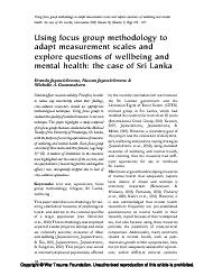Using focus group methodology to adapt measurement scales and explore questions of wellbeing and mental health: the case of Sri Lanka
Context affects research validity. Therefore, in order to reduce any uncertainty about their findings, cross-cultural researchers should use appropriate methodological techniques. Using focus groups to evaluate the quality of standard measures is one such technique. This paper highlights a study composed of six focus groups that was conducted at the Medical Faculty of the University of Peradeniya, Sri Lanka, with the purpose of assessinge quivalence of measures of wellbeing and mental health. Each focus group consisted of three males and three females (age range 35-62). A number of limitations in the measures were highlighted over the course of the sessions, and one questionnaire (measuring positive and negative affects) was subsequently dropped due to lack of cross-cultural equivalence.
Geachte bezoeker,
De informatie die u nu opvraagt, kan door psychotraumanet niet aan u worden getoond. Dit kan verschillende redenen hebben,
waarvan (bescherming van het) auteursrecht de meeste voorkomende is. Wanneer het mogelijk is om u door te verwijzen naar de bron
van deze informatie, dan ziet u hier onder een link naar die plek.
Als er geen link staat, kunt u contact opnemen met de bibliotheek,
die u verder op weg kan helpen.
Met vriendelijke groet,
Het psychotraumanet-team.
Reference:
Eranda Jayawickreme, Nuwan Jayawickreme, Michelle A. Goonasekera | 2012
In: Intervention: the international journal of mental health, psychosocial work and counselling in areas of armed conflict, ISSN 1571-8883 | 10 | 2 | 156-167
http://www.interventionjournal.com/sites/default/files/Jayawickreme_2012_Intervention_10-2.pdf
In: Intervention: the international journal of mental health, psychosocial work and counselling in areas of armed conflict, ISSN 1571-8883 | 10 | 2 | 156-167
http://www.interventionjournal.com/sites/default/files/Jayawickreme_2012_Intervention_10-2.pdf


